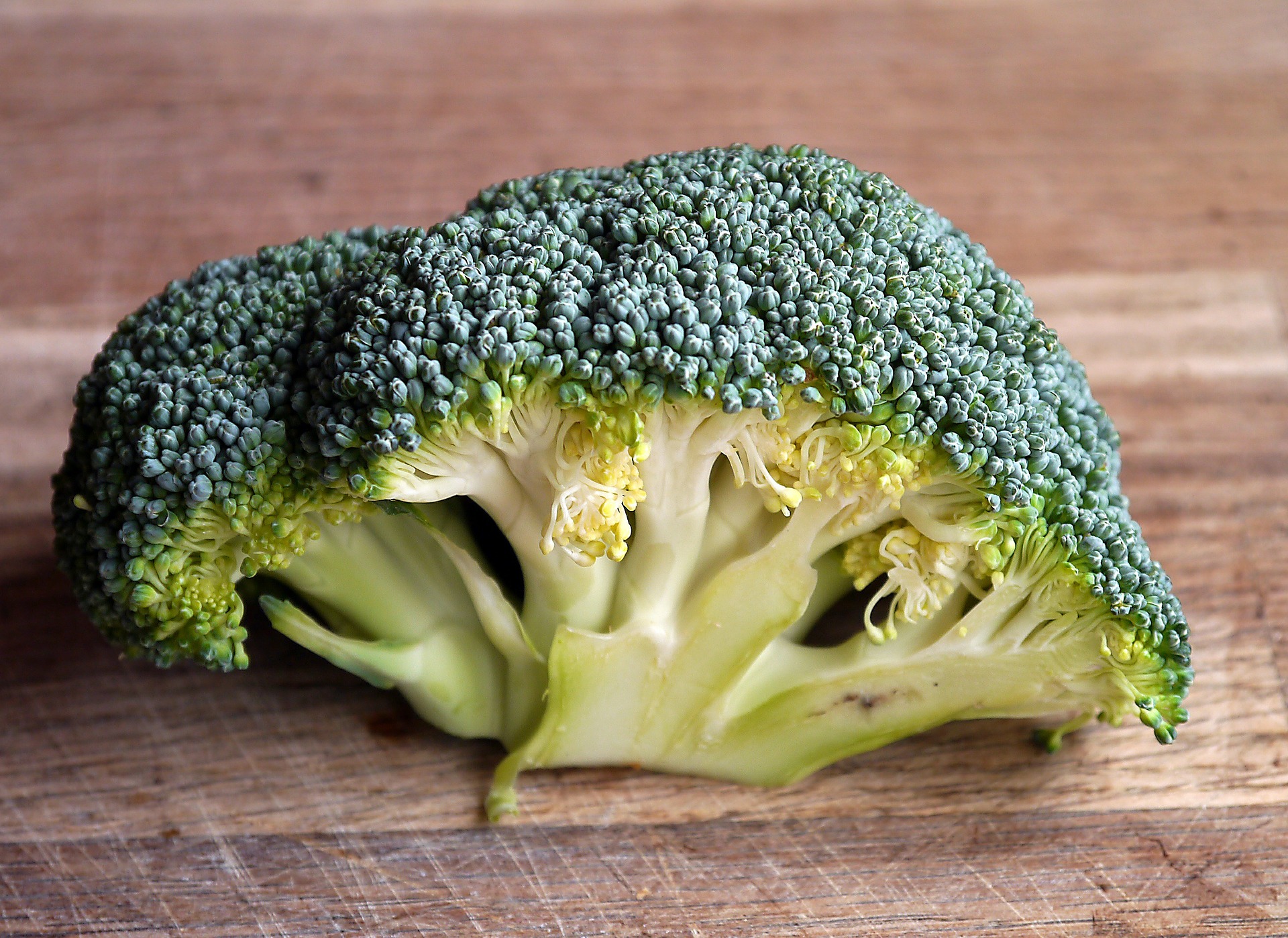
Broccoli is considered one of the healthiest vegetables we can eat. If you ask a professional like a nutritionist or doctor about nutrient-dense foods, cruciferous vegetables like broccoli will surely be included. This may be natural if you consider the antioxidants, fiber, and numerous vitamins and minerals of broccoli. Based on these nutrients, let’s take a look at some of the scientifically proven benefits of broccoli.
Before we dive into the benefits of broccoli, let’s take a look at what broccoli is. Broccoli is an edible plant in the Cabbage family and has the scientific name of Brassica oleracea. As one of the cruciferous vegetables such as bok choy, cabbage, kale and chard, it is also an excellent source of isothiocyanates, which are free radical-fighting phytochemicals. In addition to isothiocyanate, broccoli also contains sulforaphanes and indoles. These two ingredients are not only powerful antioxidants, but also act as detoxifying enzyme promoters that protect cells and DNA structures. It also contains glucosinolates, carotenoids, chlorophyll, vitamins E and K, essential minerals, and phenolic compounds, which can be very beneficial to your health.
The reason broccoli can be so powerful is because it is rich in nutrients, including high levels of vitamins and minerals. Broccoli is a great natural source of fiber and vegetable protein and rich in vitamins A, C, and K. According to a study published in April 2018 in the international academic journal Molecules, broccoli flowers contain glucoraphanin, which is converted to sulforaphane, and neoglucobrassicin, which is related to isothiocyanate, compared to other parts. In contrast, broccoli leaves were found to have higher carotenoids, chlorophyll, vitamins E and K, phenolic compounds and antioxidant activity. Broccoli nutrition facts for one cup are as follows: (DV is the recommended daily amount)
1. Helps in cancer treatment and prevention
Broccoli contains isothiocyanate. Isothiocyanates have been shown to stimulate the release of chemicals that destroy carcinogens, as well as have the ability to lower oxidative stress, protect the mitochondrial function of cells, and neutralize carcinogens by fighting toxins. High antioxidant vegetables such as cruciferous vegetables, which contain isothiocyanate, are known to significantly lower the risk of colorectal, bladder, prostate, breast and other cancers because they inhibit the growth of cancerous tumors and prevent DNA damage. there is.
In addition to the high levels of isothiocyanate as an ingredient for broccoli’s cancer-fighting properties, a phytochemical called sulforaphane also plays an important role in cancer prevention. Sulforaphanes in broccoli activate Phase II enzymes to remove chemicals that damage DNA, inhibit phase I enzymes that grow cancer cells, and nuclear factor kappabi (NF-κB). It reduces inflammation by inhibiting a complex of signaling proteins called Cruciferous vegetables, such as broccoli, are especially important for women because they can affect estrogen levels in the body and may reduce breast and cervical cancers.
Broccoli produces estrogen metabolites, which, although not directly linked to cancer, could potentially help prevent estrogen-related harm. The American Cancer Society recommends eating cruciferous vegetables several times a week for the best cancer prevention. This is to get enough of the cancer-preventing effect of broccoli, and through regular consumption, our body can strengthen antioxidants, enzyme regulation, cell cycle regulation, and will have a strong defense ability to fight cancer.
2. Maintaining bone health, such as preventing fractures and increasing bone density
Broccoli has the effect of making bones strong because it contains abundant vitamin K, calcium, potassium and magnesium, which are essential for nails, teeth and bones. Particularly high levels of vitamin K and iron are essential for maintaining bone mineral density, as well as providing other benefits such as improved blood health and vitality. One cup of broccoli contains 100 micrograms of vitamin K, which is 276% of the recommended daily intake. Also, there are studies that show that taking vitamin K and vitamin D together has a positive effect on bone metabolism, and it also has a positive effect on the balance of calcium, which is a key mineral in bone metabolism.
One cup of broccoli also contains 62 mg of calcium. Calcium accounts for about 6% of the recommended daily intake, but calcium is essential for building strong teeth and bones, and it is also effective in increasing bone density and preventing fractures. If your body doesn’t have enough calcium, your bones can become weak as your body takes calcium from your bones and makes them maintain a constant amount in your blood. From now on, add broccoli to your diet to keep your bones healthy.
3. Maintaining Heart Health
Broccoli can help control high cholesterol and high blood pressure and prevent heart attacks and strokes. A July 2002 study published in the American Journal of Clinical Nutrition found that high intakes of fruits and vegetables, especially cruciferous vegetables, were associated with a lower risk of cardiovascular disease.
Because broccoli’s high fiber content binds with cholesterol and prevents it from being absorbed into the bloodstream, it is a natural way to lower cholesterol. In addition, sulforaphane, the main ingredient in broccoli efficacy, can significantly improve high blood pressure and kidney function, and the lutein compound contained in broccoli can prevent hardening of the arteries and the accumulation of plaque, thereby preventing the risk of heart attack. Broccoli is rich in minerals that are important for protecting cardiovascular health.
These include calcium, potassium and magnesium. Calcium not only makes bones strong, but also helps blood clot and keeps muscles and nerves working properly. Potassium supports heart health by helping the excretion of sodium, and magnesium lowers blood pressure by dilating blood vessels, so it is effective in preventing cardiovascular diseases.
4. 4. Promote gut and digestive health
High-fiber foods like broccoli can help lower cholesterol levels, but they are also great for keeping your digestive system healthy. If you are currently not having a smooth bowel movement, believe in the efficacy of broccoli and try it right now. Consuming a high-fiber diet regularly, along with regular bowel movements, can help promote gut health and prevent gastrointestinal disorders such as irritable bowel syndrome (IBS).
The compounds of isothiocyanates and sulforaphane, which are abundant in broccoli, can powerfully suppress harmful bacteria in the gut, preventing the oxidative stress that can lead to cancer in the digestive tract. And according to a study in Cancer Prevention Research, an international journal in April 2009, it was confirmed that colonization of gastric bacteria was reduced and tumors and inflammation were also reduced when mice were fed a diet rich in broccoli.
5. Eye and Vision Health
Supporting eye health is one of the lesser-known benefits of broccoli. Broccoli is high in carotenoids called lutein and zeaxanthin, which can help maintain good eyesight. It also protects night vision and helps prevent UV damage that can occur to the retina and cornea of the eye. Eating a lot of foods high in antioxidants and vitamins C and A, such as broccoli, can also help prevent macular degeneration, the leading cause of blindness in the elderly.
6. Promoting skin health
It is everyone’s dream to maintain healthy, youthful looking skin as they age. The sulforaphane contained in broccoli can help to maintain overall skin health because it has the effect of repairing and repairing cell damage. In addition, high levels of vitamin A and vitamin C are effective in preventing skin damage caused by UV rays, collagen breakdown, and skin inflammation.
7. Helps Lose Weight
Broccoli is one of the most nutritious foods on the planet. This means that one cup of cooked broccoli is rich in fiber, protein and detoxifying substances, but has just over 50 calories. And because it’s high in fiber, it’s easy to balance your blood sugar levels and provides a constant energy supply, which helps you feel full. If you are on a diet right now, try increasing the amount of broccoli in your total meal. Broccoli’s high nutritional, high fiber, and low calorie properties will help you lose weight.
3 Broccoli Side Effects and Precautions
1. People with Hypothyroidism Attention
Studies have shown that broccoli has ingredients that suppress thyroid function. For this reason, it is recommended to consume broccoli for patients with hyperthyroidism, but avoid excessive intake for patients with hypothyroidism. It is not a big problem to eat a small amount every day, but it is recommended to consume it after consulting with your doctor.
2. Allergy and Drug Interactions
Broccoli can cause allergic reactions with certain medications, including warfarin. In general, cruciferous vegetables are considered very safe for humans, except for allergies. It is recommended to consult a doctor before consuming broccoli.
3. Irritable Bowel Syndrome and FODMAP Foods Caution
If you currently have irritable bowel syndrome (IBS) or are sensitive to FODMAP foods, you should pay attention to the side effects of broccoli. Vegetables such as broccoli and cauliflower are foods high in carbohydrates that are difficult to digest in the small intestine, called podmaps. FODMAP foods are not metabolized by intestinal bacteria, so they can cause bloating in the stomach and intestines, which can lead to digestive problems. Therefore, if you have gas, stomach pain, diarrhea, or constipation while eating broccoli, it is recommended to reduce the intake first and then identify the symptoms.

































